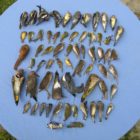Capital News Service
Coffee shops take major steps to minimize environmental impact
|
Coffee shops across the state are working to become more environmentally friendly. Measures include growing their own plants to flavor beverages, reusing glass milk bottles, donating leftover grounds to community gardens, buying beans grown without pesticides and revamping their roasting systems. We hear from owners in Coldwater, Ann Arbor and Ypsilanti and from an MSU expert.


